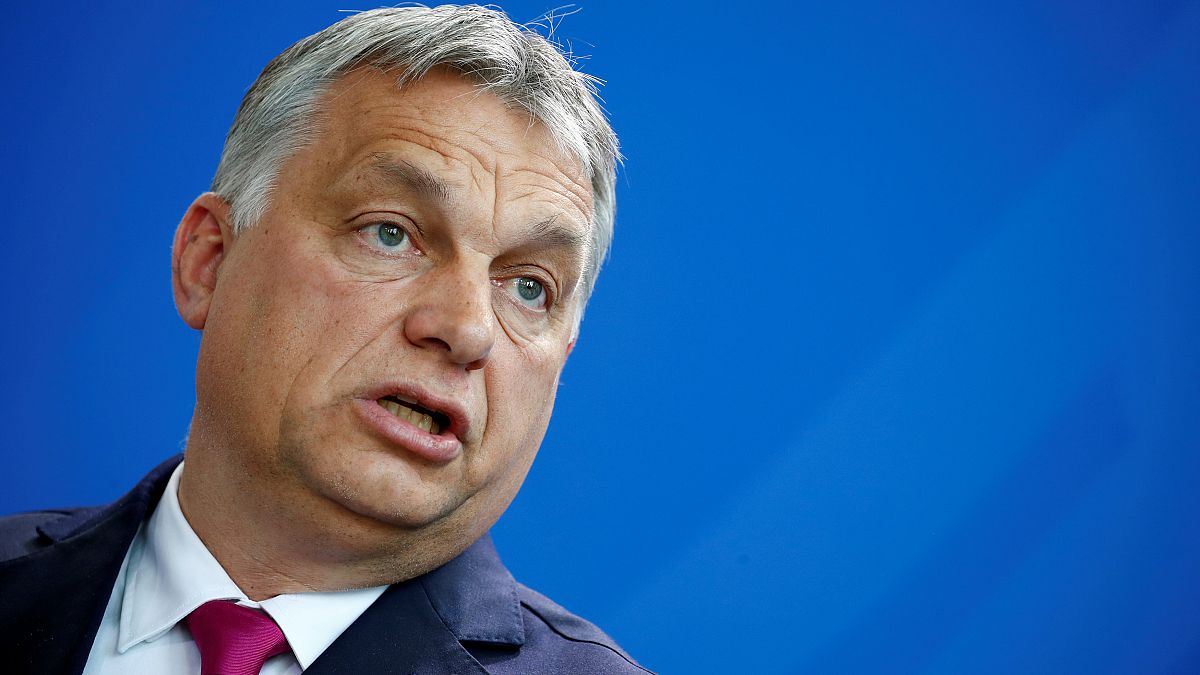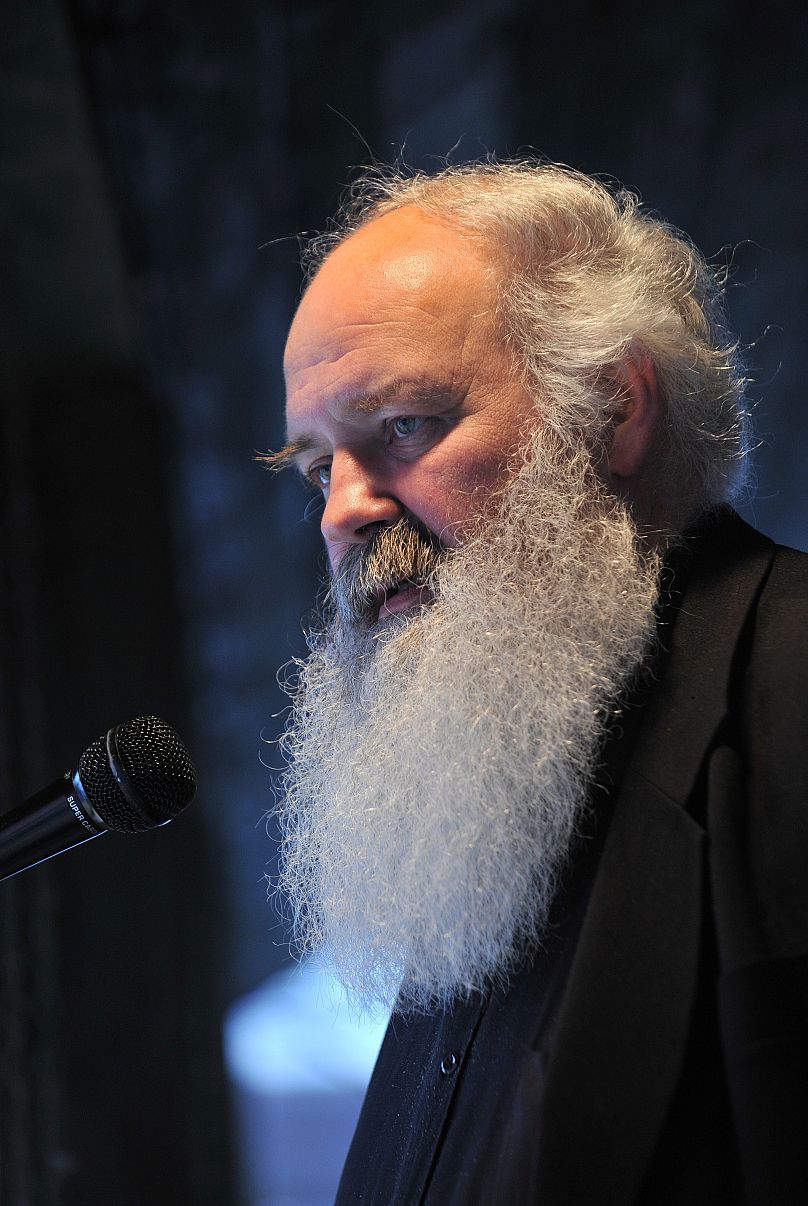A prominent Hungarian church leader says there's no divine inspiration behind the prime minister's mission to defend Christianity in Europe.
Being a Christian in Hungary is more controversial than you might think these days. On the one hand, when Viktor Orban was re-elected as prime minister in April he said he wanted to build a “21st century Christian democracy”; he has also described himself as a defender of Christian values in Europe. But on the other, the Hungarian parliament has narrowed the margins of manoeuvre for the country’s churches in recent years. The institutions most affected by the move, according to critics, are whose mission deviates from the government's political positions.
Euronews asked a prominent Hungarian church leader about the changes he has seen in public life and perspectives in his country in recent years. A pastor who baptised Orban’s two eldest children, Gabor Ivanyi is President of the Hungarian Evangelical Fellowship and Rector of John Wesley Theological College. His church was one of around 300 religious institutions stripped of their legal status under changes made to Hungary’s religious laws by Orban's government in 2011.
What do you think about Viktor Orban’s claims that he is defending Europe’s Christian values? Is it true or is he using Christianity to falsely justify his actions?
Unfortunately, the steps taken by the prime minister to protect Christianity can not really be taken seriously. On the one hand, this is not something that Europe wants, and on the other, as a believer I do not think that there is divine inspiration behind the zeal. Moreover, I believe that, in particular, the steps and statements made in the case of refugees are fundamentally contrary to the biblical principles and the expectations of Jesus Christ. Refusal, starvation, creating bureaucratic and legal hurdles, and spreading false news about asylum seekers is particularly anti-Christian behaviour. This is a shock to Bible-believing Christians, and it could also be a disgrace in the eyes of non-religious people.
Should Christians and churches in Europe be more vocal about distancing themselves from Orban and his anti-democratic policies?
Europe's Christians, churches or church-based advocacy bodies (such as the World Council of Churches) should take a firm stand against what the Hungarian prime minister represents for the alleged protection of Christianity, for his degradation of religious freedom in Hungary, for the way he demonizes his political opponents, and limits our fundamental freedoms. It would also be good if at least they would catch up to Pope Francis’ concerns and recommendations.
What is it like running a religious organisation in Hungary?
It is an especially great honor to lead a Christian community in Hungary at this time. I do not say it's easy, and I do not think it can be done without mistakes. However, it is necessary to make a clear representation of biblical principles and to raise my voice on all of the issues (whether it is a question of church, religious freedom or social justice) in which rights are violated.
How does the work that you do contribute to society?
Hungarian society has become increasingly restricted by the shrinking of its rights to liberty, limited information and increasing poverty, and so it needs more help. We are available to assist its members. However, the Hungarian people must also face the fact that they have never repented for the crimes they committed in the past hundred years. While we are mourning over the Treaty of Trianon, we forget that we in Hungary created one of the first anti-Jewish laws in modern Europe. We have never really come to repentance, because of the terrible destruction and plundering of more than half a million of our compatriots; shifting the responsibility is typical behaviour. The President of the Republic, too, can only say that we could not defend our Jewish compatriots. The reality is, however, that hundreds of thousands of civil servants, collaborative civil and semi-official groups actively worked to persecute and abduct the Jews. Our moral indignation and our inability to regret is the result of our present unworthy situation. So our work should include the awakening of our conscience, to keep it awake and to confront society. We also owe much to our Roma compatriots in difficult situations.
What changes to government policy in recent years do you find worrying?
Of the governmental policies of recent years, I can only see distressing decisions. Most recently, the series of attacks on civilians, the unworthy campaign and inhumane measures against refugees, the total control of education, limiting the press, the legitimisation of unbelievable corruption, the deprivation of health care, and the false propaganda of constantly looking for enemies, the reporting of successes and the threatening of those who question it. Government directives are only about tolerating co-operators and silencing critics.
How have these changes affected the work that you do?
In 2011, the Fidesz-KDNP coalition, with its new church law, unconstitutionally took away the status of our church, the Hungarian Evangelical Fellowship. In vain, the Hungarian Constitutional Court and the Strasbourg Court of Human Rights decided that our rights should be restored, but the Hungarian government only partially compensated us (postponing it for years), while eliminating our church status made it almost impossible for us to continue our extensive social and educational work as well. About 1000 people work in our institutions. Our schools, our homeless-care institutes, our refugee homes, our homes for the elderly, our college, our church and our hospital were brought to the edge of ruin because of the withdrawal of financial support.
What needs to change and why?
In our view, we should go back to the path of constitutionality and legality. In order to do this, another change of regime would be necessary in Hungary today. I am sorry that the European Union and the Western partners in general do not take seriously what the Hungarian government has done to destroy democracy and the rule of law. I think that today we are dealing with the export of Hungarian illiberalism (newly called Christian Democracy). I am sorry that in handling this, the allegedly democratic Western world is indulgent and powerless.
Is there anything that European institutions can do to help?
I do not know the answer. Perhaps, if they spoke up and were kept better informed about what is occurring here, they would act more firmly in our affairs and understand that what is happening to us has an impact on their operations and future as well. Of course, I am aware that in other parts of the world people suffer more for their beliefs and convictions. I cannot say exactly whether the righteous have the power, and the political and moral determination (whether they are Christians or not) to do something beyond their own direct interests. If so, they would bring about great joy. And I am convinced that it would please God.
Gabor Ivanyi is President of the Hungarian Evangelical Fellowship and Rector of John Wesley Theological College.
Opinions expressed in View articles do not reflect those of euronews.

